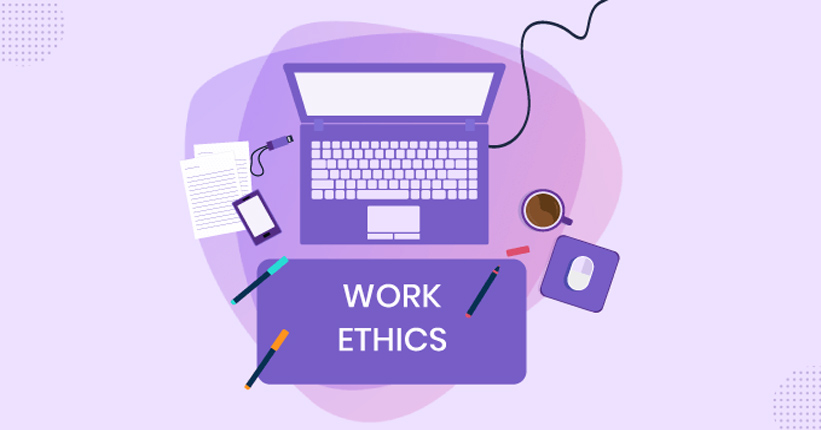Work ethic refers to a set of values, principles, and stations that individualities apply to their work. It encompasses rates similar as fidelity, responsibility, discipline, integrity, professionalism, and a strong commitment to producing high- quality work. A strong work heritage is frequently associated with a positive station, strong provocation, and a amenability to go over and beyond to meet work- related pretensions and prospects.
Work ethic chops are the specific capacities and actions that contribute to a strong work heritage. Then are some crucial work ethic chops.
1)- Trustability:
Trustability in work ethic refers to the quality of being trustworthy and reliable in one’s work. It is an essential aspect of work ethic that focuses on building trust and credibility with colleagues, supervisors, and clients. Trustability is demonstrated through consistent and dependable behavior, fulfilling commitments, and maintaining confidentiality and integrity in professional interactions.
Here are key elements that contribute to trustability in work ethic:
Honesty and Integrity: Being honest and displaying high ethical standards are foundational to trustability. It involves being truthful in communication, maintaining confidentiality when necessary, and adhering to moral and ethical principles in all professional dealings.
Reliability and Consistency: Trustability is built on being reliable and consistent in one’s work. This means consistently meeting deadlines, delivering work of expected quality, and fulfilling commitments. It involves being dependable and following through on promises and obligations.
2- Time Management:
Time management in a work environment refers to the ability to effectively plan, prioritize, and allocate time to various tasks and activities in order to maximize productivity and achieve goals. It involves using strategies and techniques to make efficient use of time, minimize distractions, and meet deadlines.
Here are some key aspects of time management in a work environment:
Prioritization: Identifying and prioritizing tasks based on their urgency, importance, and deadlines is a fundamental aspect of time management. This involves determining which tasks require immediate attention and focusing on high-priority activities that align with organizational goals.
Planning and Scheduling: Creating a structured plan and schedule helps in organizing work and allocating time.
3- Initiative
Initiative in work ethic refers to the ability and willingness to take proactive and self-motivated actions to improve work processes, contribute to organizational goals, and go beyond what is expected. It involves taking ownership of one’s work, being proactive in identifying and addressing challenges or opportunities, and seeking additional responsibilities to make a positive impact.
Here are some key aspects of initiative in work ethic:
Proactivity: Being proactive means taking the initiative to anticipate and address issues before they become problems. It involves actively seeking opportunities for improvement, proposing innovative ideas, and taking action to implement positive changes in work processes or projects.
Problem-solving: Demonstrating initiative requires a problem-solving mindset. It involves being resourceful, identifying obstacles or challenges, and actively seeking solutions. Taking the initiative to analyze problems, generate ideas, and propose viable solutions showcases a proactive approach to work.
Also Read: How to Generate Affiliate Leads and Increase Sales
4- Professionalism
Professionalism in a work terrain refers to the set of actions, stations, and rates that demonstrate a high standard of conduct, ethics, and professionalism. It involves conducting oneself in a manner that reflects respect, integrity, and capability in one’s work and relations with associates, guests, and stakeholders.
Then are crucial rudiments that contribute to professionalism in a work terrain
Professional Appearance Maintaining a neat and applicable appearance is an important aspect of professionalism. This includes dressing meetly for the plant, fixing oneself well, and paying attention to particular hygiene.
Ethical gesture Amusement with integrity and clinging to ethical norms is a pivotal element of professionalism. This involves being honest, secure, and maintaining confidentiality when needed. Upholding ethical principles in decision- timber and relations contributes to a professional work terrain.
Effective Communication Professionalism is reflected in effective and regardful communication. This includes harkening attentively, expressing oneself easily and professionally, and conforming communication style to suit different cult and situations. It also involves being regardful, considerate, and politic in relations with associates and guests.
5- Rigidity
Rigidity in a work environment refers to a situation where there is a strict adherence to rules, procedures, and policies, often to the point of inflexibility. It is characterized by a lack of openness to change, adaptability, and creativity in work processes and decision-making.
Here are some key aspects associated with rigidity in a work environment:
Resistance to Change: Rigidity often manifests as resistance to change. There may be a strong preference for maintaining the status quo and reluctance to embrace new ideas, technologies, or ways of doing things. This can hinder innovation and hinder the organization’s ability to adapt to evolving market conditions.
Lack of Flexibility: A rigid work environment may lack flexibility in terms of work schedules, work arrangements, or accommodating individual needs and preferences. There may be a strict adherence to fixed routines and procedures, which can stifle creativity and hinder productivity.
6- Self-discipline:
Self-discipline plays a crucial role in the work environment as it helps individuals stay focused, motivated, and productive. Here’s how self-discipline is important and how it can be applied in a work setting:
Task Prioritization: Self-discipline enables individuals to prioritize their tasks effectively. They can identify the most important and urgent tasks and allocate their time and effort accordingly. This helps in meeting deadlines and ensuring that critical work is completed on time.
Time Management: Self-discipline allows individuals to manage their time efficiently. They can resist the temptation of distractions, such as social media or personal activities, and stay committed to their work. By setting specific work hours and sticking to them, individuals can create a structured routine and maintain productivity throughout the day.
Developing and consistently practicing these work ethic skills can enhance an individual’s reputation, promote career advancement, and contribute to overall success in the workplace.




